Film Name:妖貓傳 / Legend of the Demon Cat
First off, whoever decided to call this film “The Legend of the Cat Demon” should go stand facing the wall for three minutes to reflect on their mistake before coming back (don’t look at me—I’ve already done my soul-searching).
Secondly, I’m genuinely surprised by how polarized the reception for this film has been—far more so than I’d anticipated. Among those who loved it and praised it, the word “beauty” came up most often. Among those who hated it and dismissed it, the word “hollow” was the most frequent complaint.
Reflecting afterward, it all makes sense… While watching, I too experienced these two starkly contrasting feelings: one marveling at the grandeur of the Tang Dynasty and its hauntingly beautiful perseverance, the other frowning at the affected mannerisms and superficial glitz.
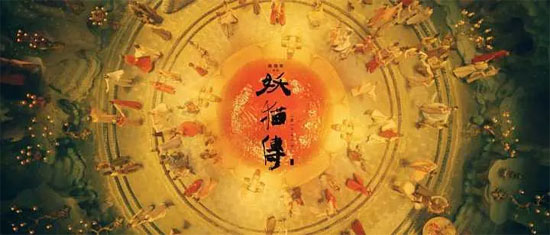
Don’t mistake me for a “two-faced hypocrite” spouting meaningless platitudes to please both sides… Truthfully, my personal inclination leans toward the former perspective. But last night, as I watched the film, I happened to be seated next to a sharp-tongued stranger who offered relentless criticism. Though he spoke sparingly, each remark instantly pulled me out of the story. This constant oscillation between immersion and distraction was utterly jarring.
[Warning: The following contains major spoilers.]
The Legend of the Demon Cat begins with the Tang Emperor’s sudden death from demonic possession and the demon cat’s rampage within and without the palace. This leads to the arrival of Master Kūkai, who sails across the seas seeking the “supreme secret teachings” of the Tang Dynasty, and Bai Letian, who is obsessed with uncovering the emperor’s cause of death, captivated by the Tang Dynasty’s golden age, and deeply enamored with “Everlasting Regret.”
Each driven by their own purpose, they naturally join forces to unravel the mystery. Following the demon cat’s trail, they gradually uncover a long-buried tale.
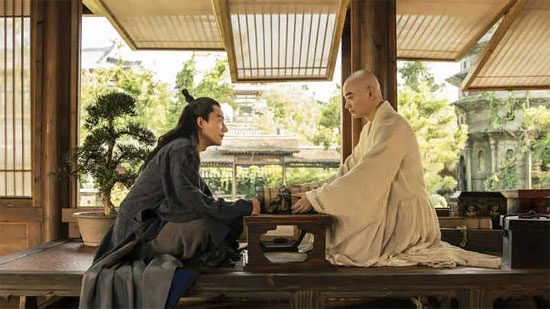
Bai Letian and Kūkai’s journey seemed like a detective adventure tracking down clues, yet also like a leisurely spring outing. I hadn’t really thought much of it until the guy next to me suddenly blurted out, “All that running around must have worn them out…”
I couldn’t help but chuckle. Though blunt, he had a point: while the duo’s journey appeared to be a quest for truth, the transitions between scenes and pivotal moments lacked the compelling “chemistry” needed to draw viewers in. It hardly qualifies as a suspenseful detective story. To put it bluntly, it doesn’t even qualify as a cursory chronicle. Its sole purpose is to guide both the characters and the audience toward the most crucial historical flashback—a sequence so thin and fragmented that it feels hollow.
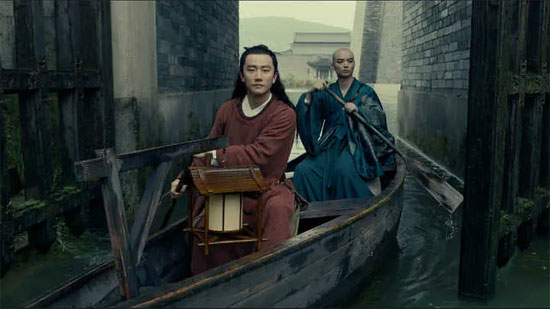
Thus, Kūkai and Bai Letian possess only the screen time and weight of protagonists, yet lack the corresponding depth and soul.
Precisely because of this “imbalance” and the “shortcomings” in character development, their images appear vastly different to different viewers: To those immersed in the narrative, Kūkai’s perpetual smile signifies confidence and insight into the illusory nature of reality. To those detached, the young monk likely appears pretentious and superficial. Similarly, Bai Letian can be seen as an artist staking everything on his art or a conceited, delusional fool…
They are merely thread-bearers, searching for answers while simultaneously searching for themselves.
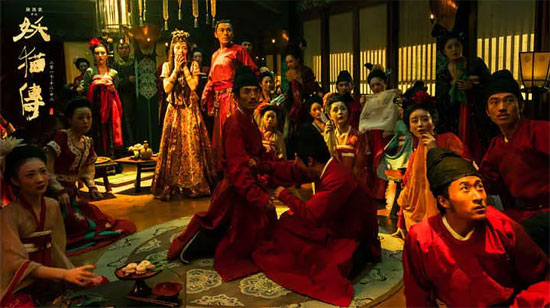
On this journey, we gradually witness the Tang Dynasty’s solemn grandeur, opulent splendor, melancholic allure, and vibrant beauty… Just as I thought the plot was “finally hitting its stride,” the director delivers another blow: (The man) just… died like that? (Chen Yunqiao) just… went mad like that?
Director Chen’s narrative here prioritizes outcomes over process. Those beautiful Tang Dynasty scenes, while visually stunning, feel more like the pervasive “illusion” throughout the film—embracing all falsehoods while encompassing every truth.
The story of thirty years hence was already unfolding thirty years prior.
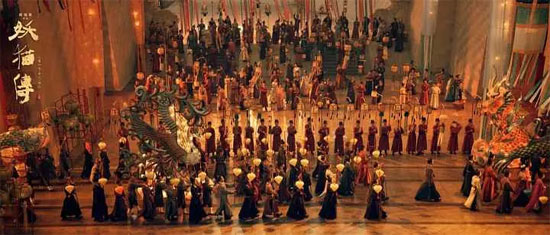
It was the zenith of the “Golden Age of Kaiyuan,” a period of splendor nearing its twilight. Men tilled the fields while women wove silk; the Silk Road bustled with trade. The land was rich in natural treasures and nurtured extraordinary talents. The air was filled with the scent of ink and paper, rivers overflowing with poetic verses. Heroes radiated heroic spirit, illuminating the vast world. Neon lights flickered amidst songs and dances of peace and prosperity (I couldn’t help but hum “Dream Back to the Tang Dynasty”)…
Yet even this seemed insufficient. Emperor Xuanzong was unsatisfied, the court officials were unsatisfied, and the common people were unsatisfied… Thus, all craved an illusory feast of ultimate bliss.
And Yang Guifei—whose “glance and smile captivated all, leaving the six palaces’ beauties pale in comparison”—became the main course of this lavish banquet, the full moon in the vast expanse of the starry sky.
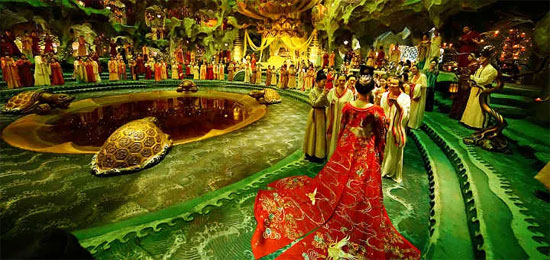
This was more than just “thousands of beauties in the imperial harem, all favor concentrated on one.” Yang Yuhuan was the golden calling card of the Tang Dynasty’s golden age, the very embodiment of extravagance.
Amidst the neon lights and intoxicating revelry, even knowing the dazzling spectacle before them was an illusion, most chose to believe the magic was real.
This feast of ultimate pleasure delivered many surprises. The elegant and majestic Consort Yang counted as half a surprise, while the unrestrained Li Bai was worth one and a half.
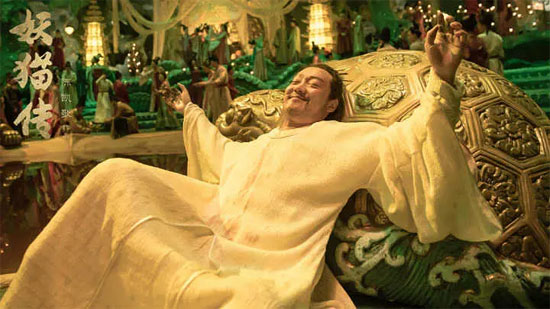
In my mind, this was precisely how the devilishly wild “Poetic Immortal” should appear: a court poet living in drunken oblivion, commanding eunuchs like Gao Lishi to remove his boots… Only such a man could pen verses like: “Clouds evoke thoughts of her robes, flowers of her beauty; Spring breeze caresses the balustrade, dew glistens thick. Had I not met her atop Mount Qunyu, I’d seek her beneath the moon at the Jade Terrace.”
Another surprise is the extravagant yet brilliant Emperor Xuanzong. With verses like “Spring nights are too short, dawn finds me late; henceforth, the sovereign neglects his morning court” and “Slow songs and frivolous dances linger with strings and flutes; all day long, the sovereign watches, never sated,” came the unparalleled “supreme bliss”… Yet this Li Longji was only half complete. It was only when he personally drummed and danced for An Lushan, and cried out “Still the Emperor!” while fleeing Chang’an, that he became whole.
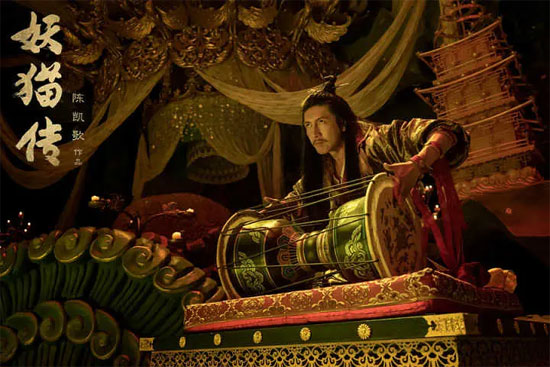
Extreme things reverse; prosperity inevitably declines.
Kūkai and Bai Juyi’s quest was the prologue, the feast of ultimate bliss the prelude. The true narrative began with the crowd trapped at Mawei Station.
All loved Yang Yuhuan, yet none wished to bear the guilt of crushing a flower. Li Longji refused, Gao Lishi could not bear it, Abe no Nakamaro remained silent—and Yang Yuhuan herself would never expose the charade everyone knew yet pretended not to see.
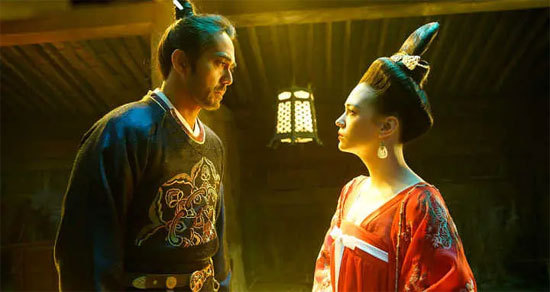
Thus, as this ostensible tale from thirty years prior neared its end, the fair maiden and her beloved could only meet their fate: “Beneath the earth at Mawei Slope, no trace remains of her jade-like beauty where she died.”
The main text now connects to the prologue’s words, returning to the opening question of “Legend of the Demon Cat”: What exactly is this demon cat? And why does it keep causing trouble? What truth will Bai Letian and Kūkai, guided here all along, uncover about the death of Yuhuan?
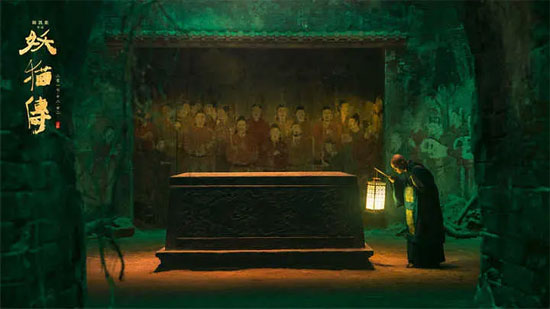
Only now does the film reach its true climax: its opening strokes are grand and sweeping—the golden age of Kaiyuan, the splendor of the Tang Dynasty, the feast of ultimate bliss, the An Lushan Rebellion, and the tragic demise of beauty. Yet its closing strokes are delicate and tender, shifting from the ethereal to the tangible—love at first sight, a pearl obscured by dust, unwavering devotion, and a bond that transcends life and death.
The true protagonists of this tale are Yang Yuhuan and the White Crane Youth—everyone adored Yang Yuhuan, including Danlong and Bailong.
Yet after Master Huanghe’s treacherous scheme, their paths diverged.
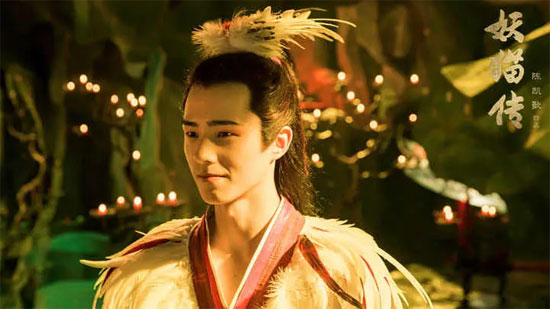
The thirty-year-long entanglement of resentment and obsession, like a festering poison beneath the façade of prosperity, was finally healed by the pure flesh of the White Crane youth. Kūkai grasped the supreme secret art without entering the Temple of the Azure Dragon; Bai Juyi composed “Everlasting Regret” with unrestrained emotion, altering not a single word. The lines “Though heaven and earth may come to an end, this sorrow shall never cease” fit perfectly here.
Emotionally, I find myself drawn to the modest yet contented resolution of “Legend of the Demon Cat,” captivated and enchanted by it—not to mention the film’s vivid portrayal of the Tang Dynasty’s grandeur. That era stands among the most splendid chapters in China’s history, evoking boundless fascination.

Rationally speaking, “Legend of the Demon Cat” feels too ethereal and unreal. To many, even the most beautiful “castle in the air” should offer steps for the audience to ascend—a magnificent palace with staircases and ropes. Yet this film lacks both. Its overly deliberate narrative and elaborate setup leave it feeling merely beautiful yet ultimately insubstantial and elusive. How can it evoke empathy or move the heart?
Consider Chen Kaige’s unparalleled masterpiece Farewell My Concubine. It encompasses everything from the intimate “a lifetime of madness” to the grand “don’t you come out and see what’s playing in the world now?”
By comparison, “Legend of the Demon Cat” at least preserves personal affection, which is far more gentle and orderly than the line from “The Promise” twelve years ago: “You ruined my chance to be a good person!”

Rationally speaking, “Legend of the Demon Cat” feels too fantastical and unreal. To most viewers, even the most beautiful “castle in the air” should be a magnificent structure with stairs for visitors to ascend. Yet this film offers neither steps nor ropes. Its overly deliberate narrative and elaborate setup make it seem ethereal and elusive beyond beauty—how can it evoke empathy or emotion?
Consider Chen Kaige’s unparalleled masterpiece Farewell My Concubine. It encompasses everything from the intimate “a lifetime of madness” to the grand “don’t you come out and see what’s playing in the world now?”
By comparison, “Legend of the Demon Cat” at least preserves personal affection, which is far more gentle and orderly than the line from “The Promise” twelve years ago: “You ruined my chance to be a good person!”

Besides, “Legend of the Demon Cat” at least features a black cat—for someone like me who once had a stray black kitten, this little creature is a definite plus.
Please specify:Anime Phone Cases » Legend of the Demon Cat 妖貓傳 2017 Film Review: A beautiful but illusory castle in the air—is it meant for admiration or for climbing?